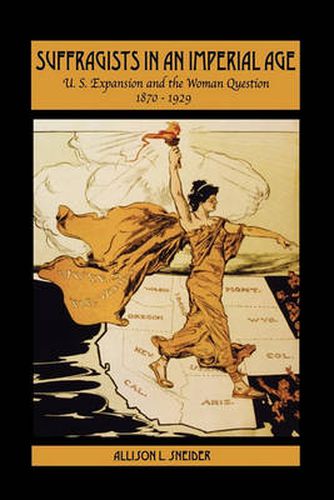Readings Newsletter
Become a Readings Member to make your shopping experience even easier.
Sign in or sign up for free!
You’re not far away from qualifying for FREE standard shipping within Australia
You’ve qualified for FREE standard shipping within Australia
The cart is loading…






In 1899, Carrie Chapman Catt, who succeeded Susan B. Anthony as head of the National American Women Suffrage Association, argued that it was the duty of U.S. women to help lift the inhabitants of its new island possessions up from barbarism to civilization, a project that would presumably demonstrate the capacity of U.S. women for full citizenship and political rights. Catt, like many suffragists in her day, was well-versed in the language of empire, and infused the cause of suffrage with imperialist zeal in public debate.Unlike their predecessors, who were working for votes for women within the context of slavery and abolition, the next generation of suffragists argued their case against the backdrop of the U.S. expansionism into Indian and Mormon territory at home as well as overseas in the Philippines, Puerto Rico, and Hawaii. In this book, Allison L. Sneider carefully examines these simultaneous political movements–woman suffrage and American imperialism–as inextricably intertwined phenomena, instructively complicating the histories of both.
$9.00 standard shipping within Australia
FREE standard shipping within Australia for orders over $100.00
Express & International shipping calculated at checkout
In 1899, Carrie Chapman Catt, who succeeded Susan B. Anthony as head of the National American Women Suffrage Association, argued that it was the duty of U.S. women to help lift the inhabitants of its new island possessions up from barbarism to civilization, a project that would presumably demonstrate the capacity of U.S. women for full citizenship and political rights. Catt, like many suffragists in her day, was well-versed in the language of empire, and infused the cause of suffrage with imperialist zeal in public debate.Unlike their predecessors, who were working for votes for women within the context of slavery and abolition, the next generation of suffragists argued their case against the backdrop of the U.S. expansionism into Indian and Mormon territory at home as well as overseas in the Philippines, Puerto Rico, and Hawaii. In this book, Allison L. Sneider carefully examines these simultaneous political movements–woman suffrage and American imperialism–as inextricably intertwined phenomena, instructively complicating the histories of both.